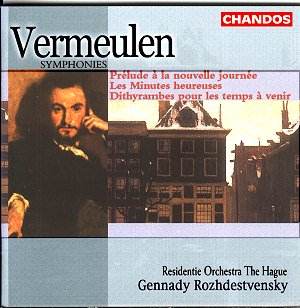Here you will encounter energy, desperation and joy in torrents from the Netherlands' rebel-eccentric symphonist: a voice in the wilderness. He was as much an outsider in his own land as Allan Pettersson was in Sweden. This disc offers three time-obsessive symphonies; two future-inclined and one nostalgic for past times. These are extremely impressive though they each finish in a way that leaves you wondering why. They lack that sense of inevitability in closure although otherwise they are wildly imaginative pieces.
The Second Symphony is in five movements encompassing a wide range of expression. Vermeulen (originally van der Meulen) uses a slowly seething sea of detail. There is a Stravinsky-like bleakness in the manner of The Rite of Spring, a chaos of activity as in Villa-Lobos, piping as if in some in chilly hell (cf. the symphonies of Allan Pettersson), a Petrushkan edge to the flutes. The music has the élan and muscularity of an inextinguishably gusty desperate energy. It is shorn of the intoxication of Vermeulenís First Symphony. The work is reflective of his adoration of Lenin (he was considering dedicating it to Lenin).
The Sixth Symphony is in three movements played without a break. The title is from Baudelaire the original line from which, in translation, reads 'I know the art of evoking happy moments'. The piece was written for van Beinum and premiered, after the dedicatee's death, by the Utrecht SO conducted by Paul Hupperts. The second movement is a Sibelian andante amoroso which is very refined with slow quiet strings and a cor anglais line gently intoned. In the Allegro finale, not for first time, the ticking of a clock is evoked. Berg and Panufnik are suggested as is a manic clockwork maze of marching figures - aspiring and depressing. The music alternates a blaze of energy with a rugged oleaginous strata of inky waves
The Seventh Symphony was premiered by the Concertgebouw under Bernard Haitink on 2 April 1967. This was just a couple of months before the composer's death. Here are no mythic visions á la John Ireland's and Arthur Symons' These Things Shall Be. The dishevelled and unkempt heartless skelter of life is fully there in the first and third movements but in the second there is a slackening into meditation - a pointillist turning vortex of dreams.
Leo Samama keeps us on the straight and narrow with his booklet notes. The gratifyingly customary attention of Chandos to every single detail is a joy to the heart. Rozhdestvensky is just the man for these symphonies. He and his orchestra are on cracking form as with their last Chandos disc (which included Postnikova in the Scriabin Piano Concerto). I trust that, rather as with Hol (CHAN 9796 and 9952) and Dopper (CHAN 9884 and 9923 - I would rather like to hear those Dopper symphonies), there will be a second and third disc so that Rozhdestvensky can also offer up the other four symphonies. There is no competition for this coupling. If you would like to hear all seven symphonies and cannot wait for Chandos to catch up then Donemus have an attractive boxed set which is still there for the buying. The sound quality in that case while extremely acceptable is not up to Chandos's richly translucent standard.
Rob Barnett


